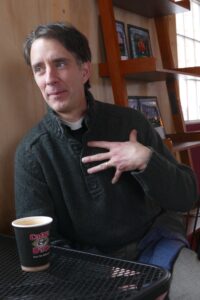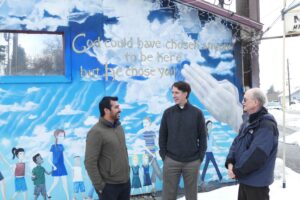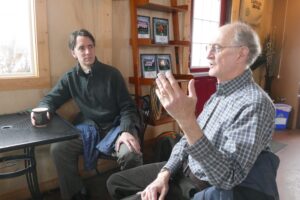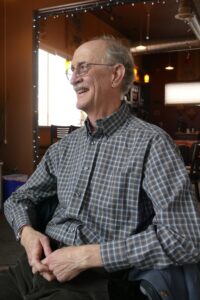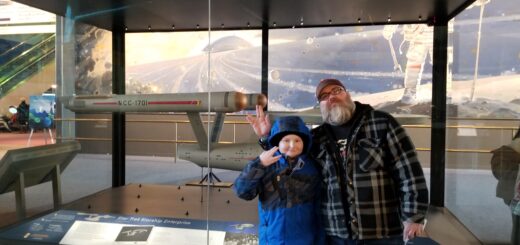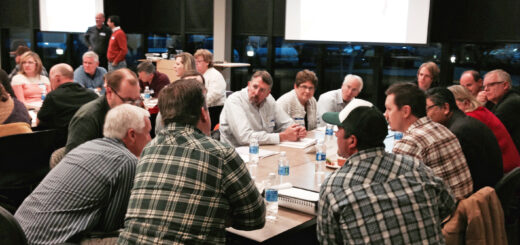Film to be shown here Feb. 26 explores how we can build community face-to-face
[podcast src=”https://html5-player.libsyn.com/embed/episode/id/5092129/height/90/width/450/theme/standard/autonext/no/thumbnail/yes/autoplay/no/preload/no/no_addthis/no/direction/forward/” height=”90″ width=”450″]
Pastor Matt Canlis has a dream of strengthening the South Wenatchee neighborhood by connection people with each other and the place they live. The approach relies on face-to-face interactions, collaboration and deep listening.
Canlis, the pastor of Trinity Church, saw the power of this approach as a pastor in Scotland before he took the position here. A documentary he wrote — Godspeed: The Pace of Being Known –is going to be shown free of charge on Sunday, Feb 26, 7 p.m. at Liberty Cinema, with a community discussion afterwards.
Trinity Church shares space with the Wenatchee Brethren Baptist Church, led by Pastor David Morrow.
The film, which begins in a tiny parish in Scotland where Canlis was a pastor and ends in South Wenatchee, asks viewers what would be possible if we built by taking our time to deeply listen and appreciate our neighbors, whether we agree with their opinions and values or not?
It’s about choosing to live in community with your neighbors at a slower pace rather than unconsciously submitting to the frenetically-paced and device-centric lifestyle that most of us find ourselves captives to.
Canlis found that by slowing down to what he called “Godspeed” and having actual conversations with deep listening fosters a much stronger sense of community, his life was enriched.
Canlis discovered this powerful approach to serving a community, which goes back to the origins of Christianity with its traditions of hospitality, generosity and relationship.
In South Wenatchee, he sees the same kind of face-to-face living that exists in Scotland.
With the film and collaboration with other community and faith leaders, he hopes to start a conversation and join a growing movement that is working to bring South Wenatchee neighbors together.
Canlis, who graduated from the University of Washington and attended seminary at Regent College in Vancouver, B.C., traveled to Scotland with his wife where they were both doing working on PhDs. His family runs the famous Canlis Restaurant on Queen Anne Hill.
He found a job as a parish assistant in Scotland and assumed that he would have an office, write sermons and work out new marketing approaches to attract people to attend church. “I had bright ideas, business plans and marketing ideas,” he said with a laugh.
Instead, he found that his job was to walk the parish, interact with people, and serve them in a face-to-face manner. He learned as much or more from those where not church goers than he did from those who did, Canlis said.
A defining moment for Canlis occurred when he met Alan Torrance, a giant of a man with flaming red hair who frequently wore kilts. Canlis admitted being intimidated at first by Torrance.
“He invited me in, offered me a cup of tea, sat me down and gave me hospitality although I was a stranger,” said Canlis.
“Alan, who didn’t have much, happily had me in his home, gave me what he had, and began to teach me that slowing down and sharing what you have is a different way to live,” he continued. Torrance taught him that the definition of poverty is being unwilling to share what you have.
Canlis hopes that South Wenatchee can become a place that is “a beacon of light to America and beyond about different kinds of people learning how to love one another.”
“This is a very slow process of going face to face with neighbors and not assuming we have something to give but probably something to receive.”
Trinity Church is not the only church in the valley taking a community-based approach. Missio Dei Church takes a similar approach, as does the Latino outreach efforts by the Lutheran Church here, to name a few.
This is a powerful film that has as much to do with healthy communities as religion. That’s why I believe Canlis is onto something that could transform our valley. “We want people who are different to know each other, to talk to one another, and not just to persuade them, but to learn and to grow. That’s my prayer,” said Canlis.
Community building takes all of us and it’s heartening to see the faith community throughout the valley taking important steps like this to bring people together.

